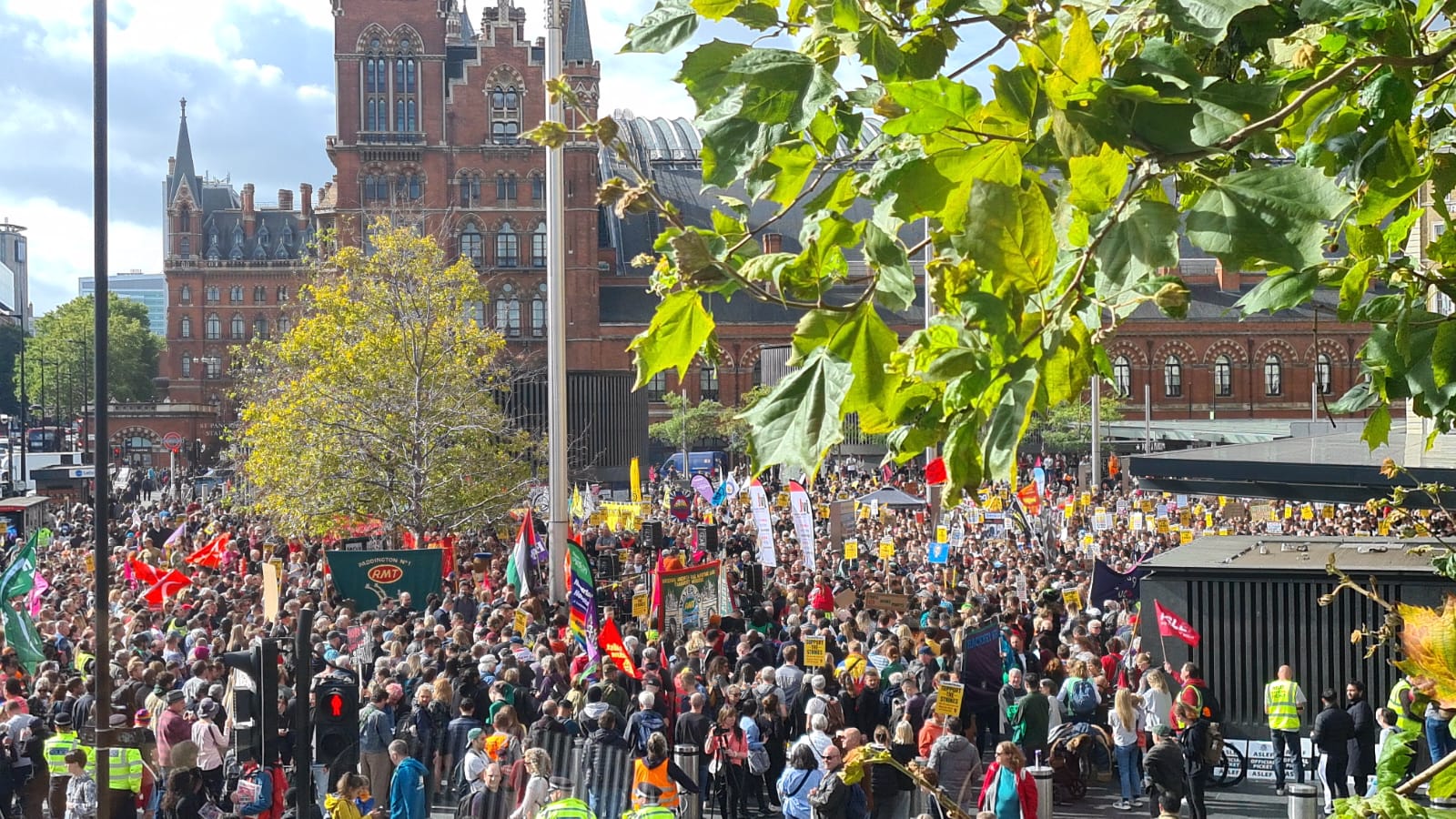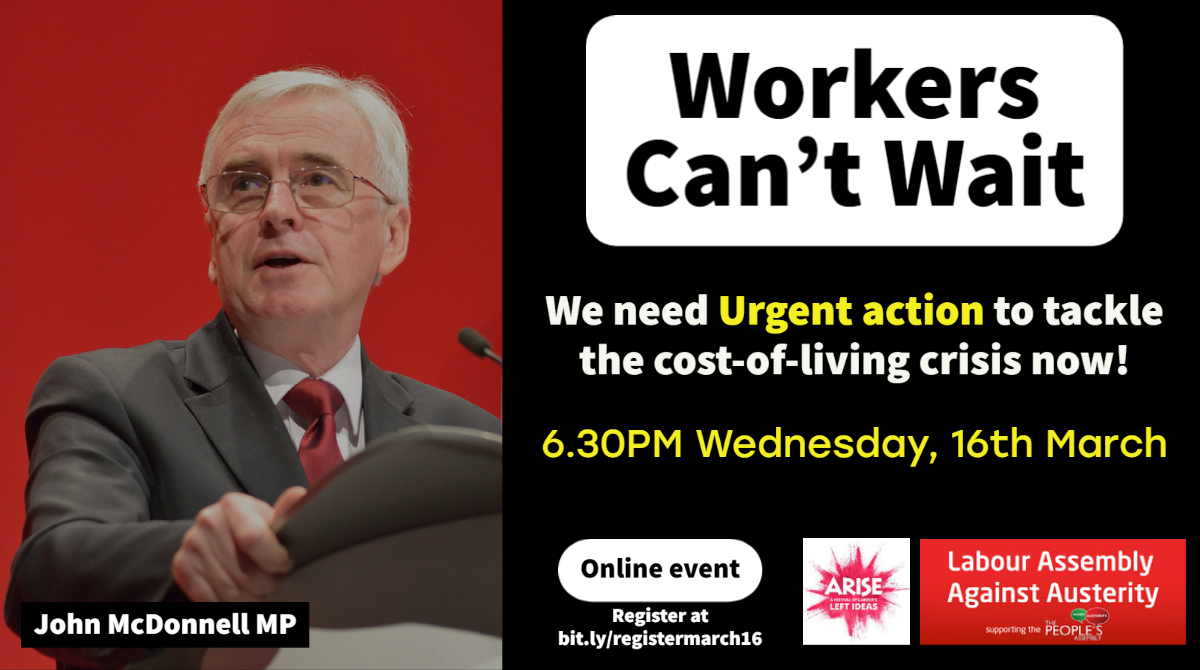Katy Clark MP’s speech to Labour Assembly Against Austerity’s Ending Austerity Budgets meeting on 17th March 2014
It’s been a very sad week for the left in many ways. For those of us who knew and worked with Bob Crow and felt the suddenness of his passing, it’s been a very difficult week. His loss was very unexpected.
Tony’s loss on Friday was more expected I know some close to him have thought it coming for some time but I think it was a massive shock for all of us. He had such energy, such charisma, such commitment and such principle, and takes so many experiences with him, I think it will take some time to come to terms with it.
I’ve just come from the Parliamentary Labour Party where we paid tributes to Tony Benn and where Dave Watts, the new chair of the Parliamentary Labour Party, said some words about him. And Ed Miliband spoke of his charisma, and his commitment to democracy, and expressed what a loss it meant. And spoke of Tony as a parliamentarian who believed in using this place to hold the executive to account. And he also spoke about him as a human being, obviously Ed Miliband knew Tony, he first met him when he was 12, and he talked about the sort of person he was.
And I think that contrasts quite sharply with a number of things that have been said over the last few days about Tony, because its been used as an opportunity by some people to settle old scores. I really hope as we go forward we hear more about Tony’s ideas and some of the things he believed in and some of the campaigns he was involved in, whether that was attempts to get some kind of industrial democracy in this country in the 1970s, whether it was on equality issues, or indeed on disarmament and I believe he resigned from a position in the late 60s over the issue of nuclear disarmament and whether Britain should have nuclear weapons.
So I very much hope as we go forward, we hear about the most dangerous man in Britain and we really focus on why its about policies and not personalities which I think has been brought home to me over the last few days. The reason why I think Tony Benn is a loss isn’t really about him as a human being because I didn’t know him very well, because I didn’t know him very well, but about what he stood for and his complete…. he was a recognisable face of a lot of the campaigns that a lot of us are involve with on a daily basis.
So I hope as we go forward we think of that and I think tonight it is fitting that we do mention him because he was incredibly active in all these campaigns, right until the end. He was one of the founders of the People’s Assembly which Steve [Turner] I’ve no doubt will talk about later, and he was involved in all of our struggles against cuts, whether that was the McNulty Review where 20,000 jobs will be lost in the railways, whether that is the campaign against cuts in local government funding that we’re witnessing up and down the country – and its probably worse up in Scotland than it is down here depending on where you live in England, if you live in the Tory shires you’ve done nicely out of the way they’ve changed how things are calculated, or whether its another campaign that we’re all involved in and aware of, how the austerity cuts we’ve seen over the last few years have affected communities up and down the country.
And of course we’ve probably not seen anything yet. The Tories are delighted to be rolling back the state. We’re told that at least two thirds if not more of the cuts are still to come. And while they talk about recovery, in areas like where I represent there is no sign whatsoever of any recovery taking place. The reality is tens of billions of pounds are being taken out of working class communities, some of the most deprived communities in this country, and meanwhile bankers bonuses are back on the rise and the City of London is doing very well thank you very much
So we’ve got a big challenge ahead of us to present a very positive vision that ends austerity, that persuades people austerity doesn’t work, that actually it wasn’t the Labour government s fault that we ended up in the economic difficulty that we’re in. And lets be honest we lost that argument. We didn’t put forward a strong enough argument as to why the economic crisis took place and we need to renew our strength to put forward the arguments. About why its necessary to spend money, particularly in difficult economic times. But also why we need to move collectively forwards. Why we need a public sector. Why we need to use government to change our country to redistribute wealth, from one part of the country to other parts of the country, but also to redistribute from those that have the most to those who have the least. And yes you need to find ways to use industrial democracy and a whole range of ways and forms of democracy, to really redistribute power in this country.
And that’s the charge we face in budget week, where I’ve no doubt we’re going to have a race as to who’s going to cut more, who’s going to cut less, squabbles around levels of taxation, whether that’s a 25% basic rate or whether its a 40 or 50% rate, when we know that income is only one of the ways we need to redistribute wealth in this country. And a real task for us is to map where the wealth and power is in this country and come up with solutions that bring that wealth and that power under some sort of democratic control. And I honestly believe we can do that.
We’ve come through far more difficult times than the one we’re in at the moment, but we need to start giving those facts and it’s a shame that it’s Oxfam who are giving those facts at the moment and telling us who it is who owns most of the wealth in the world and indeed which families it is who own most of the UK. I’ve learnt a lot more about which families own most of the UK since I’ve been here because I’ve spoken to a lot of Conservative MPs and over the time I’ve found out that they are the great grandson of Queen Victoria or who owns a large estate in your constituency and the reality is its still the case that far too few people own far too much of the power but also far too few people have access to places like this.
The reality is far too many of the people who get elected to this place come from the same families again and again and again. And what we’ve got to do is find a way of blowing open this democracy for the people of this country, so they actually understand how the economy works, and I think we can do that with a lot more facts on the table, because the reality is of course over the last few years have led to a redistribution of wealth and power, but not the kind of redistribution we’d be looking for but a redistribution of wealth power in the sense of growing in equality in this country.
So as we go forward we need to say clearly we will fight for these policies of a 50p tax rate. We will fight for these policies to build more homes, and we will argue they should be council homes under democratic control. We will campaign for the energy freeze and indeed reform of the energy sector, but we have to say very clearly, that regulation is probably not going to go far enough and we need to find a way to bring the energy sector under democratic control. We will campaign to bring the bedroom tax to an end. And indeed we will campaign for a budget that will be about investment and growth, not about saying that what we need to do is cut public services to cut the deficit. Because the reality is the only way we are ever going to cut that deficit is when Britain is working again, when we have growth, when we see the kind of investment, whether that is building high speed rail, whether that is building the hundreds of thousands of houses that are needed, or whether that is investing in regenerating the communities that have gone through the industrial revolution, which were built perhaps on the back of the slave trade but have helped build the wealth of this country, we must ensure they regenerate within themselves.
And I think if we do that and talk in a simple enough language, we will be successful in moving the Labour Party, but also in moving any government of any political persuasion to respond to our agenda. Because the reality is politicians only move when they come under pressure, which is why I think the People’s Assembly and indeed the Labour Assembly is so important, because what this is about is making sure we build the grassroots, we build the pressure from below, so politicians of whatever political hue, have no choice but to recognise austerity doesn’t work, and that there is an alternative.
Thank you.



0 Comments